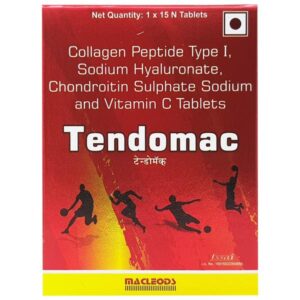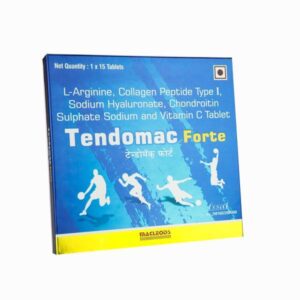VIT C + CHONDROITIN + SODIUM HYALURONATE + COLLAGEN PEPTIDE
Vit C: Drug: Vitamin C (Ascorbic Acid)
Use: Vitamin C is a water-soluble vitamin that plays a crucial role in maintaining the overall health of the body. It is primarily used as a dietary supplement to prevent or treat vitamin C deficiency. Vitamin C is also used for various other therapeutic purposes, including boosting the immune system, promoting wound healing, and reducing the risk of chronic diseases.
Mechanism of Action: Vitamin C acts as a powerful antioxidant, protecting the body against oxidative stress caused by free radicals. It is involved in the synthesis of collagen, a protein vital for the maintenance of connective tissues, skin, blood vessels, and bones. Vitamin C also enhances iron absorption, supports proper immune function, and helps in the regeneration of other antioxidants such as vitamin E.
Dose: The recommended daily intake of vitamin C varies depending on age, sex, and specific health conditions. For adults, the average daily intake should be around 75-90 mg per day. However, certain individuals, such as smokers, pregnant women, and people with certain health conditions, may require higher doses. It is commonly available in various forms, including tablets, capsules, chewable tablets, powders, and intravenous solutions.
Side Effects: Vitamin C is generally safe and well-tolerated when taken within the recommended dosage range. However, in high doses, it can cause gastrointestinal disturbances, including diarrhea, nausea, and stomach cramps. Extremely high doses of vitamin C (over 2,000 mg/day) can lead to more severe adverse effects like kidney stones, iron overload, and vitamin B12 deficiency.
It is important to note that vitamin C should not replace a well-balanced diet, and excessive supplementation without medical advice should be avoided. If you have any underlying health conditions or are taking medications, it is always recommended to consult with a healthcare professional before starting any new supplements, including vitamin C.
Chondroitin: Chondroitin is a dietary supplement that is often used in combination with glucosamine for the treatment of osteoarthritis. It is a naturally occurring compound found in cartilage and connective tissues in the body.
The exact mechanism of action of chondroitin is not well understood. It is believed to work by reducing inflammation, promoting the production of cartilage components, and inhibiting the enzymes responsible for the breakdown of cartilage.
Chondroitin is typically taken orally as a capsule or tablet. The recommended dose for adults is 1,200 to 1,800 milligrams per day, divided into two or three doses. It can be taken with or without food.
Common side effects of chondroitin are generally mild and may include nausea, diarrhea, constipation, stomach pain, and headache. Some people may experience allergic reactions, such as rash or itching. Chondroitin may also interact with certain medications, such as blood thinners, so it is important to consult with a healthcare professional before taking it.
It is important to note that while chondroitin is widely used as a supplement for osteoarthritis, there is limited scientific evidence to support its effectiveness. Some studies have shown modest benefits in reducing pain and improving joint function, while others have shown no significant difference compared to a placebo. Individuals considering chondroitin should discuss its potential benefits and risks with their healthcare provider.
Sodium Hyaluronate: Sodium Hyaluronate is a medication that is used for the treatment of osteoarthritis of the knee. It is a type of hyaluronic acid, which is a substance that naturally occurs in the synovial fluid of joints.
The mechanism of action of Sodium Hyaluronate is not fully understood. However, it is believed to work by lubricating and cushioning the joint, which helps to reduce pain and inflammation associated with osteoarthritis.
Sodium Hyaluronate is administered via intra-articular injection directly into the affected knee joint. The recommended dose is a series of three to five injections, administered at weekly intervals. Each injection typically contains 2-3 mL of the medication.
Some common side effects of Sodium Hyaluronate include pain or swelling at the injection site, warmth or redness in the treated joint, and joint stiffness. These side effects are usually temporary and resolve on their own.
Rarely, more serious side effects may occur, such as infection in the joint, allergic reactions, or blood clots. If any of these occur, immediate medical attention should be sought.
It is important to note that Sodium Hyaluronate is only approved for use in osteoarthritis of the knee. Its safety and efficacy in other joint conditions or areas of the body have not been established.
As with any medication, it is important to follow the instructions provided by your healthcare provider and report any concerning side effects or symptoms. They will be able to assess your individual situation and determine if Sodium Hyaluronate is an appropriate treatment option for you.
Collagen Peptide: Collagen Peptide is a drug that contains a short chain of collagen protein molecules. It is primarily used for treating various health conditions related to joint pain and skin health.
The mechanism of action of Collagen Peptide is attributed to its ability to support the production of collagen in the body. Collagen is a vital structural protein that provides strength and elasticity to connective tissues such as skin, tendons, ligaments, and cartilage. As we age, the production of collagen decreases, resulting in the deterioration of these connective tissues and leading to joint pain and skin aging.
By supplementing with Collagen Peptide, it provides the body with the necessary building blocks to promote the synthesis of collagen. This can help improve joint health, reduce joint pain, and enhance skin elasticity and hydration.
The recommended dose of Collagen Peptide may vary depending on the brand and formulation. Typically, a common dosage is around 5-10 grams per day, which is usually dissolved in water or mixed with food and beverages. However, it is always advised to follow the specific instructions provided by the manufacturer or consult with a healthcare professional for personalized dosage recommendations.
Collagen Peptide is generally considered safe and well-tolerated, with minimal side effects reported. However, some individuals may experience mild gastrointestinal symptoms such as bloating, diarrhea, or stomach discomfort. These side effects are usually temporary and resolve on their own.
It is important to note that Collagen Peptide is not a cure for any underlying medical condition, and its effectiveness can vary from person to person. It is always recommended to consult with a healthcare professional before starting any new medication or supplement, especially if you have any pre-existing medical conditions or are taking other medications.


